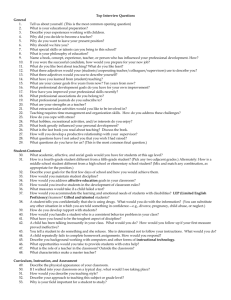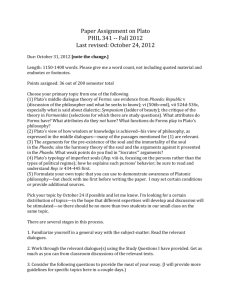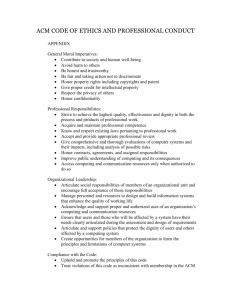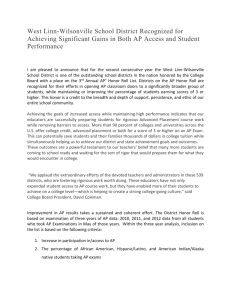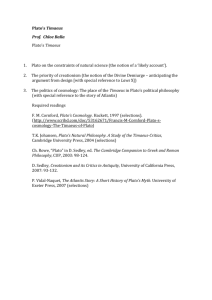Making Sense of Ourselves
advertisement
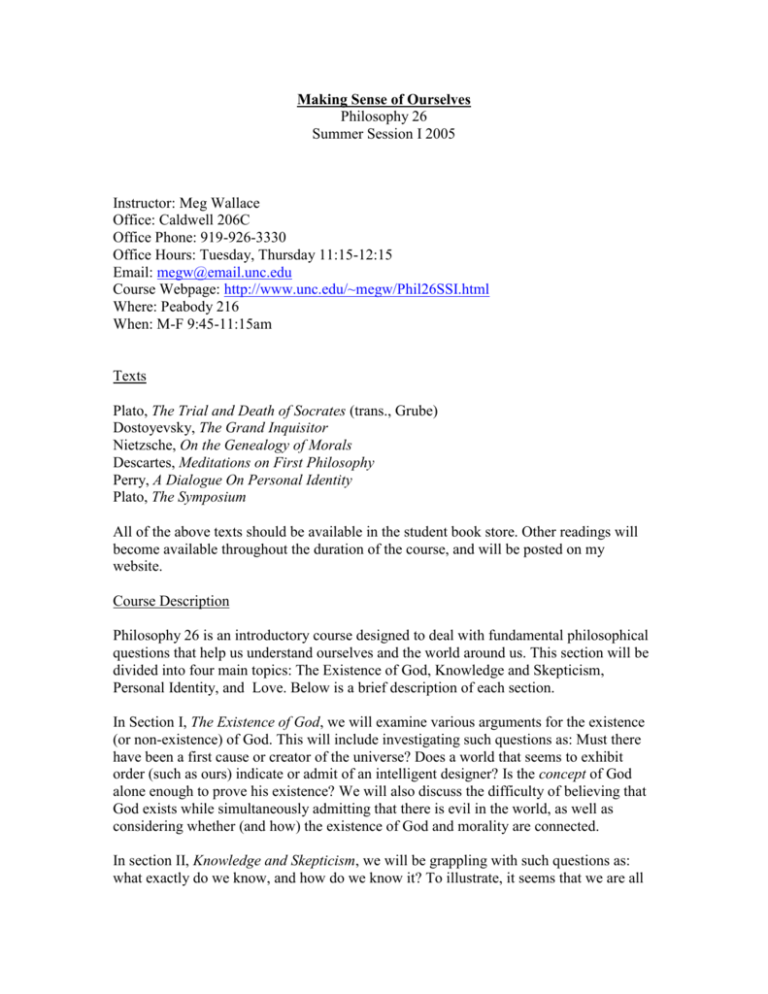
Making Sense of Ourselves Philosophy 26 Summer Session I 2005 Instructor: Meg Wallace Office: Caldwell 206C Office Phone: 919-926-3330 Office Hours: Tuesday, Thursday 11:15-12:15 Email: megw@email.unc.edu Course Webpage: http://www.unc.edu/~megw/Phil26SSI.html Where: Peabody 216 When: M-F 9:45-11:15am Texts Plato, The Trial and Death of Socrates (trans., Grube) Dostoyevsky, The Grand Inquisitor Nietzsche, On the Genealogy of Morals Descartes, Meditations on First Philosophy Perry, A Dialogue On Personal Identity Plato, The Symposium All of the above texts should be available in the student book store. Other readings will become available throughout the duration of the course, and will be posted on my website. Course Description Philosophy 26 is an introductory course designed to deal with fundamental philosophical questions that help us understand ourselves and the world around us. This section will be divided into four main topics: The Existence of God, Knowledge and Skepticism, Personal Identity, and Love. Below is a brief description of each section. In Section I, The Existence of God, we will examine various arguments for the existence (or non-existence) of God. This will include investigating such questions as: Must there have been a first cause or creator of the universe? Does a world that seems to exhibit order (such as ours) indicate or admit of an intelligent designer? Is the concept of God alone enough to prove his existence? We will also discuss the difficulty of believing that God exists while simultaneously admitting that there is evil in the world, as well as considering whether (and how) the existence of God and morality are connected. In section II, Knowledge and Skepticism, we will be grappling with such questions as: what exactly do we know, and how do we know it? To illustrate, it seems that we are all pretty sure that we are here in this room right now, reading the syllabus. But what proof, the skeptic might ask, do can we offer to show that we aren’t dreaming, hallucinating, or being deceived by an evil demon? In light of such a challenge, we will then explore different ways of responding to the skeptic. In section III, Personal Identity, we will try to understand what it is that makes the same person over time. For example, we are fairly certain that a little boy at 2 could age and change into an old man of 90. But what is it that makes him the same person? All of his cells could have changed and transformed and been replaced, his memory may have declined, and he may not even recognize himself if given a picture of himself as a little boy. But many of us would still be inclined to think that, nonetheless, the old man is the same person as the little boy. We will explore how this could be so, and why. Finally, in Section IV, Love, we will read Plato’s Symposium and discuss various different conceptions of what love is. (This section will be more developed depending on how pressed we are for time at the end of the semester.) Course Requirements (i) 3 Papers There will be 4 short paper assignments given throughout the semester, one on each section. However, you are required to do only 3. This means that you will have some choice as to which paper topics you want to write on, but they must be turned in on the due dates listed below. Papers will be expected to be approximately 3-5 pages in length. (ii) Participation You are expected to read the assignments, think carefully about the readings, and come to class prepared. Part of what makes philosophy so engaging is being able to discuss various views with others. My hope is that this course will provide you with a forum where such discussion can take place. Thus a small part of your grade will be allotted for participation, which includes coming to class, taking part in class discussions, turning in class assignments, coming to office hours, etc. Grades Your final grade in this course will be broken down as follows: First Paper Second Paper Third Paper Participation 30% 30% 30% 10% General Advice Philosophy is oftentimes difficult. You may find that you need to read an article several times before you even have a sense of what the article is about. Please don’t get frustrated—you’ll discover that having patience and working through such arduous material will be incredibly rewarding. However, chances are that even reading and rereading the material will not be enough. That is why I encourage every single one of you to see me in my office hours whenever you feel you need the extra help. I have two hours a week specifically allotted for meeting with students, but feel free to make an appointment with me if another time would be more convenient. Also, I am open to having group meetings or study sessions outside of class time whenever you feel such a meeting would be beneficial (I have in mind here review-like sessions prior to a paper due date, but I leave it to you to decide when you might be in need of such sessions). Class Schedule Be aware that the following schedule is tentative, as I am sure reading assignments and discussion dates will change. However, I will try to keep fixed the paper due dates, so please take note of them. I will not tolerate late assignments. Week 1 May 17 & 18: Intro; A Little Bit of Logic; Plato’s Euthyphro May 19 & 20: The Ontological Argument; The Cosmological Argument; Telelogical Arg (if we have time) Week 2 May 23: Teleological Argument May 24 & 25: Dostoyevsky’s “Rebellion” in The Grand Inquisitor; The Problem of Evil May 26 & 27: Nietzsche, On the Genealogy of Morals; God and Morality Week 3 May 30: NO CLASS!! MEMORIAL DAY! May 31-June 1: Descartes’ Meditations June 2 & 3: General Skepticism; Problems of Induction (if we have time) First Paper Due: Friday June 3 Week 4 June 6-10: Perry, A Dialogue On Personal Identity; Identity Over Time; Puzzles of Change Second Paper Due: Friday June 10 Week 5 June 13-17: Plato’s Symposium; Love Last Day of Classes: Friday June 17 Third Paper Due: Monday June 20 Honor Code The Chancellor has asked faculty to include the following statement in all course syllabi: "The Honor Code prohibits lying, cheating or stealing when these actions involve academic processes or University, student or academic personnel acting in an official capacity. The Campus Code requires students to conduct themselves in such ways as not to impair the welfare or the educational opportunities of others in the University community. As a UNC student, you have accepted a commitment to the Honor Code and the Campus Code, and the principles of academic integrity, personal honesty, and responsible citizenship on which they were founded more than 100 years ago. Academic dishonesty in any form is unacceptable, because it circumvents the purpose of the University's life and work. As a faculty member, I have a responsibility to report any possible Honor Code violations to the Student Attorney General. I trust that you will join me in supporting the Honor Code by signing the Honor Pledge on all written work, and by consulting me if you are uncertain about your responsibilities within this course." If you have any questions about the honor code in this course or anything else in this syllabus, please ask.



